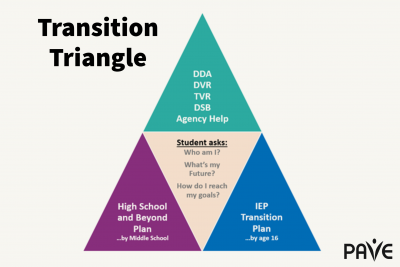The planning process to support a student with disabilities toward their adult life plans requires coordination and organization. This graphic provides a visual overview of the work and who is responsible to help. The center upside down triangle describes key questions for a student as they move through school and toward adulthood: The three colored Read More
Category: IEP
A legal document that is made for each child who needs special education. This document is dynamic and needs to be reviewed periodically.
Glossary of Key Terms for Life After High School Planning
ADA: Americans with Disabilities Act. Prohibits discrimination against individuals with disabilities in all public and private places open to the general public. Adult Services: Programs available to support individuals after they become legal adults at 18. Age of Majority: In Washington, 18. An adult is responsible for educational, vocational, financial, and other decisions unless other Read More
Frequently Asked Questions for Life After High School
What is person-centered planning? Person-centered planning focuses on you! It’s about making plans for your future based on what you like, need, and dream about. You get to make big decisions, and the plan adapts as you grow. What happens to my accommodations and services when I graduate or leave high school? In high school, Read More
What’s Next? High School Transition Planning Timeline
Description of the above graphic: What’s Next? High School Transition Planning Mapping the Future Check these milestones to ensure high school paves a pathway for young adult success and achievement! Ages 13-14Student begins High School and Beyond Plan in Middle School—a WA State requirement for all students. Ages 15-16IEP includes a Transition Plan, aligned with Read More
How to Request an Evaluation for an Individualized Education Program (IEP)
Use this step-by-step checklist to track your child’s progress through the evaluation process. Child Find is the requirement that all school districts must identify all children within their boundaries, ages birth through 21 who have disabilities. Any child can be brought to the attention of a school district by any person (parent, school personnel, or Read More
Special Education Terms
Glossary of Terms Alternative Dispute Resolution (ADR): also known simply as dispute resolution or procedural safeguards; options for resolving disagreements between parents and school districts; Washington’s options include facilitation, mediation, community complaint, and due process hearing. Americans with Disabilities Act (ADA): the federal law that makes it unlawful to discriminate against individuals with disabilities in Read More
Your Child’s Application for Developmental Disabilities (DDA)
A Step -by-Step guide to submitting and application for DDA on behalf of your child. The Washington State Developmental Disabilities Administration (DDA) provides services for individuals with developmental and intellectual disabilities. DDA is responsible for administering various Medicaid waivers that provide essential services to families who have members who have a developmental disability. Applying for Read More
Who’s Who on the IEP Team
The IDEA requires that certain individuals be included in the IEP team, and their input is valuable in creating a plan that addresses the unique needs of the student. Here are the key members of the IEP team. The team works together to develop a comprehensive plan that addresses the unique needs of the student Read More
Communication Log
Maintaining a clear record of who said what and when is simplified with a school communication log. This tool streamlines the organization and retrieval of your notes pertaining to phone calls, letters, face-to-face meetings, emails exchanged with your child’s teachers, and any other interactions involving the school. For parents of children with an Individualized Education Read More
Common Accommodations and Modifications in an IEP For 3-5 year old’s
Accommodations and modifications for 3-5-year-olds should be tailored to meet the unique needs of each child. These young children may have various developmental, cognitive, and sensory challenges, so it’s important to work closely with a team of educators, therapists,and parents to create an effective IEP. Examples of accommodations and modifications Accommodations Modifications *Remember that the Read More
Your Child has Met the Eligibility for an IEP – Preparing for the IEP Meeting
Use this checklist to prepare for the meeting to discuss special education and related services with your child’s IEP team.
Steps to Read, Develop, and Understand an IEP Worksheet
The IEP document is a lot to absorb. You will be better prepared to support your child when you review the IEP draft before meeting with the IEP team for the first time. A child’s education is worth taking time to read for understanding. Subject Service Minutes What Related/Ancillary Services is your child eligible to Read More
Differences Between Part B and Part C Services
The Individualized Family Service Plan (IFSP) ends when a child turns 3. Transitioning to a services under an Individualized Education Program (IEP) requires a new evaluation and is a team-led process. Let this handout serve as your cheat sheet for the differences between the IFSP and IEP. Individualized Family Service Plan(IFSP) Individualized Education Program(IEP) Ages: Read More
Step-By-Step Guide to Requesting Accommodations on SAT and ACT Exams
The transition from high school to college can be a daunting experience for any teenager. Part of the transition process is preparing for and taking the entrance exams for college. If the student is receiving accommodations in school, they may qualify to receive special accommodations while taking a college entrance exam. The ACT and College Read More
Military Interstate Children’s Compact Commission (MIC3), Part 3: How the Compact Protects Academic Progress toward Graduation
A Brief Overview Full Article The Military Interstate Children’s Compact Commission (MIC3, pronounced “mick three”) is the more commonly used name for the Interstate Compact on Educational Opportunities for Military Children. MIC3’s rules provide consistent guidelines for how public schools address the most common challenges military-connected students experience during a PCS (permanent change of station, Read More

